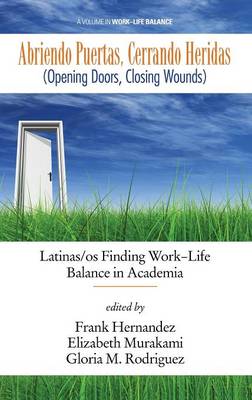Work-Life Balance
1 total work
Abriendo Puertas, Cerrando Heridas ( Opening Doors, Closing Wounds)
by Frank Hernandez, Elizabeth Murakami, and Gloria M. Rodriguez
Published 16 April 2015
Abriendo Puertas, Cerrando Heridas (Opening Doors, Closing Wounds): Latinas/os Finding Work-Life Balance in Academia is the newest book in the series on balancing work and life in the academy from Information Age Publishing. This volume focuses on the experiences of Latina/o students, professors, and staff/administrators in higher education and documents their testimonios of achieving a sense of balance between their personal and professional lives. In the face of many challenges they are scattered across the country, are often working in isolation of each other and must find ways to develop their own networks, support structures, and spaces where they can share their wisdom, strategize, and forge alliances to ensure collective.
The book focuses on Latinas/os in colleges of education, since many of them carry the important mission to prepare new teachers, and research new pedagogies that have the power of improving and transforming education. Following the format of the work-life balance book series, this volume contains autoethnographical testimonios in its methodological approach. This volume addresses three very important guiding questions (1) What are the existing structures that isolate/discriminate against Latinas/os in higher education? (2) How can Latinas/os disrupt these to achieve work-life balance? And, (3) Based on their experiences, what are the transformative ideologies regarding Latinas/os seeking work-life balance?
The book focuses on Latinas/os in colleges of education, since many of them carry the important mission to prepare new teachers, and research new pedagogies that have the power of improving and transforming education. Following the format of the work-life balance book series, this volume contains autoethnographical testimonios in its methodological approach. This volume addresses three very important guiding questions (1) What are the existing structures that isolate/discriminate against Latinas/os in higher education? (2) How can Latinas/os disrupt these to achieve work-life balance? And, (3) Based on their experiences, what are the transformative ideologies regarding Latinas/os seeking work-life balance?
